

Who Does the Ethicist Think He Is? Is it ethical for a student to submit the same paper in two college classes?
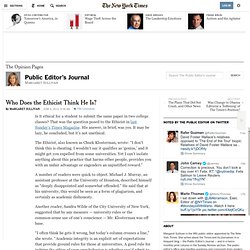
That was the question posed to the Ethicist in last Sunday’s Times Magazine. His answer, in brief, was yes. It may be lazy, he concluded, but it’s not unethical. The Ethicist, also known as Chuck Klosterman, wrote: “I don’t think this is cheating. I wouldn’t say it qualifies as ‘genius,’ and it might get you expelled from some universities. A number of readers were quick to object. Another reader, Sandra Wilde of the City University of New York, suggested that by any measure — university rules or the common-sense use of one’s conscience — Mr. Flow of Information. The Timeline: A look at linear time and information: from the occurrence of an event, era, social movement or discovery, ...to the documentation of evidence relating to this event, era, social movement, etc.to how the evidence is disseminatedand how researchers (and term paper writers) can find this documentation One Day - Days Later Articles appear in newspapers , and information is disseminated on TV, radio and web pages .
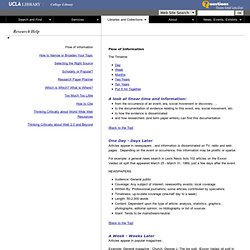
Depending on the event or occurrence, this information may be prolific or sparse. For example: a general news search in Lexis Nexis lists 102 articles on the Exxon Valdez oil spill that appeared March 25 - March 31, 1989, just a few days after the event. A Week - Weeks Later Articles appear in popular magazines . Example: General magazine : Church, George J. Subject-focused magazine : Barinaga, Marcia, Fisheries first to suffer. Magazines Six Months or More Later Articles appear in scholarly or academic journals . The Bedford Research Room. Top Ten Databases - Top Ten Databases to Start Your Undergraduate Research - Research & Technology Guides at University of Michigan Library. Home - PMC - NCBI. The National Digital Public Library Is Launched! by Robert Darnton. The Digital Public Library of America, to be launched on April 18, is a project to make the holdings of America’s research libraries, archives, and museums available to all Americans—and eventually to everyone in the world—online and free of charge.
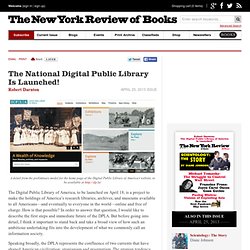
How is that possible? In order to answer that question, I would like to describe the first steps and immediate future of the DPLA. But before going into detail, I think it important to stand back and take a broad view of how such an ambitious undertaking fits into the development of what we commonly call an information society. Speaking broadly, the DPLA represents the confluence of two currents that have shaped American civilization: utopianism and pragmatism. The utopian tendency marked the Republic at its birth, for the United States was produced by a revolution, and revolutions release utopian energy—that is, the conviction that the way things are is not the way they have to be.
Plagiarism: Understanding the Crucial Concept. Notes on "Ways to Originality" Character Report Card. On Quotes and Quoting. Using Sources. Evaluating Arguments and Checking Sources. Ruth Fremson/The New York TimesTheodore Ogunbiyi-Roche, 10, drank a large soda in Times Square in Aug., 2012, as New Yorkers debated Mayor Bloomberg’s plan to prohibit sales of large sugary drinks.
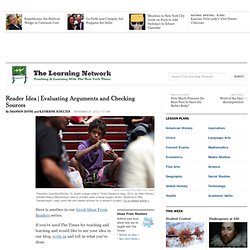
Students in Rita Tamalavage’s class used this and related articles for a research project. Go to related article » Here is another in our Great Ideas From Readers series. If you’ve used The Times for teaching and learning and would like to see your idea in our blog, write in and tell us what you’ve done. Today, we feature two ideas from Rita Tamalavage, who teaches at Nativity B.V.M. Teacher: Rita Tamalavage Institution: Nativity B.V.M., Pottsville, Pa. Grade Level of Students: Secondary (ages 14-18) Evaluating Arguments Idea: Students categorize the claims and arguments of other students, by using writing from The Learning Network’s Student Opinion feature, then chart those claims to help prepare for a debate or panel discussion on the topic.
What Ms. Related Resources Checking Sources Idea: Avoiding Plagiarism. Research. Writing "Original” Papers § Harvard Guide to Using Sources. Some writing assignments you receive at Harvard will explicitly ask you to present an "original" thesis, claim, or idea.
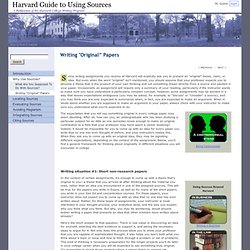
But even when the word "original" isn't mentioned, you should assume that your professor expects you to develop a thesis that is the product of your own thinking and not something drawn directly from a source and planted in your paper. Occasionally an assignment will require only a summary of your reading, particularly if the instructor wants to make sure you have understood a particularly complex concept; however, some assignments may be worded in a way that leaves expectations ambiguous (you may be asked, for example, to "discuss" or "consider" a source), and you may think you are only expected to summarize when, in fact, you are expected to make an argument.
Creativity. Questions. Are we asking the right questions? - Ideas. Advice for effective analytical reasoning. Good list of cognitive biases Wikipedia List of Cognitive Biases (Please read this before continuing below.)
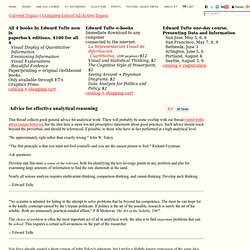
After reading through the list, one wonders how people ever get anything right. That's called the "cognitive biases bias," or maybe the "skepticism bias" or "paralysis by analysis. " Statistical literacy guide.